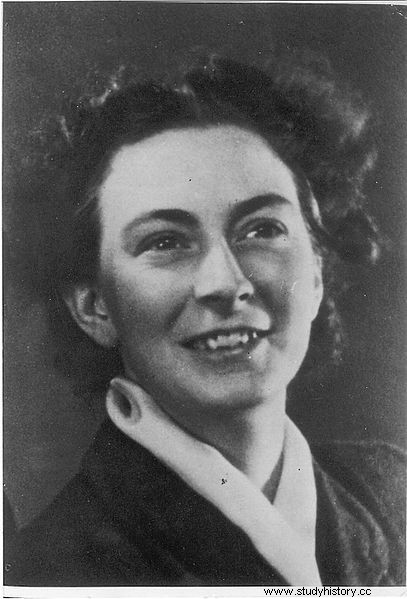Andrée De Jongh (1916 – 2007) is the co-founder and leader of the Comète resistance network, an escape route for Allied soldiers during the Second World War.
Between artistic and medical career
 Andrée De Jongh was born on November 30, 1916 in Schaerbeek, one of the 19 municipalities that make up Brussels in Belgium. Inspired by the heroic figure of Edith Cavell, a British nurse who became a spy during the First World War, she was drawn to the medical world. Proving to be nevertheless gifted for drawing, she embarked on studies of decorative arts while training to become an ambulance attendant. After her studies, she became an advertising designer with the Sofina company in Malmédy, a French-speaking town located in the province of Liège.
Andrée De Jongh was born on November 30, 1916 in Schaerbeek, one of the 19 municipalities that make up Brussels in Belgium. Inspired by the heroic figure of Edith Cavell, a British nurse who became a spy during the First World War, she was drawn to the medical world. Proving to be nevertheless gifted for drawing, she embarked on studies of decorative arts while training to become an ambulance attendant. After her studies, she became an advertising designer with the Sofina company in Malmédy, a French-speaking town located in the province of Liège.
The Comet Network
When German troops invaded Belgium, Andrée De Jongh joined the Red Cross in Brussels, where she took care of wounded Allied soldiers. She then decides to join the Resistance and gets involved in a first network, which is dismantled. With the help of her father Frédéric and another member of her first network, Arnold Deppé, she then embarked on the creation of an escape route to Spain, crossing occupied France by train. In July 1941, the first trip successfully took a group of Belgians south who wanted to continue the fight in England.
In August 1941, Andrée and Arnold each guide a group but Arnold is arrested in France. In Bilbao, Andrée forged ties with the British consulate to ensure, from Spain, the transfer of escapees to England. The English end up trusting him and, with the support of resistance fighters, Andrée creates the "Dédée line", linking Brussels to Madrid, which will later become the "Comète line". Until the Liberation, the network enabled the escape of more than 700 soldiers, including 118 accompanied by Andrée.
Arrest
In 1943, Jacques Desoubrie, an agent of the Geheime Feldpolizei (German counterintelligence service), infiltrated the Comète network. On January 15, 1943, while accompanying a group of airmen, Andrée De Jongh was captured on the outskirts of the Pyrenees, then imprisoned in Bayonne, Biarritz and the Fresnes remand center. She admits having founded the Comète network, but the Gestapo does not believe her. In July 1943, she was deported to Germany, to several prisons and then to the Ravensbrück and Mauthausen concentration camps. She was released by the International Red Cross on April 22, 1945. Her father, captured in June 1943, was executed on March 28, 1944.
After the war, Andrée settled in the Belgian Congo, in Cameroon, in Ethiopia where she worked in a leper colony then in Senegal before returning to Belgium. For her actions during the war, she received the American Medal of Freedom, the English George's Medal and the Belgian Croix de guerre. She is made a knight of the French Legion of Honor and of the Belgian Order of Leopold, as well as a lieutenant-colonel of the Belgian army. In 1985, she was made countess within the Belgian nobility.
André De Jongh died on October 13, 2007 at the age of 88.
